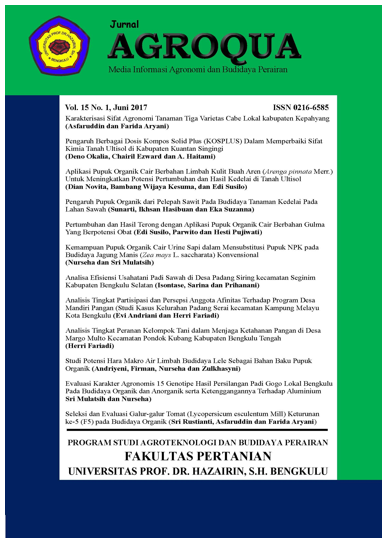EFFECTIVENESS OF CAPPA-CARRAGEENAN TO INCREASE TO RESISTANCE OF FRESHWATER CRAYFISH Cherax quadricarinatus TO Aeromonas hydrophila INFECTION
DOI:
https://doi.org/10.32663/ja.v22i1.4205Keywords:
A. hydrophila bacteria, kappa-carrageenan, crayfish C. quadricarinatusAbstract
Crayfish Cherax quadricarinatus is one of the fishery commodities that has business prospects not only as an ornamental fish commodity but also as a consumption commodity. Disease attacks caused by bacteria cannot be avoided, so one of the efforts made to increase the resistance of crayfish by giving kappa carrageenan is to increase the resistance of the crayfish. The purpose of this study was to determine the level of resistance of C. quadricarinatus to A. hydrophila bacterial infection by giving kappa carrageenan with different frequencies which is effective for increasing lobster survival after challenge tests with A. hydrophila bacteria. The study was conducted using a completely randomized design (RAL) with five treatments and three replications, namely control (without injection of kappa carrageenan), 1 time, 2 times, 4 times, and 6 times of injection kappa carrageenan. During maintenance, kappa carrageenan was given at a dose of 5 μg/g of oyster by dissolving 2.5 mg in 1 ml of Phosphate Buffer Saline (PBS) and then injected into lobster as much as 20μl/head. on day 30, challenged with A. hydrophila bacteria. The results showed that giving kappa-carrageenan 2, 4, and 6 times showed the same results (P>0.05) on the absolute growth of crayfish. The survival rate of crayfish given kappa-carrageenan showed that the frequency of giving 4 times showed the highest survival rate. Water quality during the study consisting of oxygen 6.25 mg/l, carbodioxide 3.68 mg/l, pH 6.8, ammonia 0.17 mg/l, and temperature 26.9 °C showed that it was still in the range that was feasible as a maintenance media
References
Abirami, R. G., & Kowsalya, S. (2013). Antidiabetic activity of ulva fasciata and its impact on carbohydrate metabol-ism enzymes in alloxan induced diabetic rats. International Journal of Research in Phytochemistry and Pharmacology, 3(3), 136–141
Aodoys, (2009). Teknik Penyuntikan Ikan. http://aodoys.blogspot.com/2009/08/teknik-penyuntikan-pada -ikan.html. diakses pada Februari 2012.
Effendie. (1997). Biologi Perikanan. Yayasan Pustaka Nusatama: Yogyakarta. 163 ha
Effendi, (2002). Biologi Perikanan. Yayasan Pustaka Nusantara, Yogyakarta.
Gaspersz, V. (1991). Metode Perancangan Percobaan. CV.ARMICO. Bandung
Hakim, D. M., Tjahjaningsih, W., Sudarno, Abdilla, A.A. (2016). Pengaruh ekstrak alga merah (Kappaphycus alvarezii) terhadap jumlah total bakteri dan nilai organoleptik ikan Kembung (Rastrelliger sp.). Jurnal Ilmiah Perikanan dan Kelautan.
Hudaifah, I. (2020). Komponen bioaktif dari euchema cottonii, ulva lactuca, halimeda opuntia, dan padina australis. Jurnal Lemuru, 2(2), 63–70.
Hutabarat, M. A. A., Sari, N. I., & Leksono, T. (2013). The Antibacterial Effectiveness Of Seaweed (Eucheuma Cottonii) Extract On Bacillus Cereus And Pseudomonas Aeruginosa. Riau University.
Jasmanindar (2009). Pengggunaan Ekstrak Gracilaria verrucosa untuk Meningkatkan Sistem Ketahanan Udang Vaname Litopnenaeus Vannamei. Bogor. Institut Pertanian Bogor.
Kreckhoff, R. L., Ngangi, E. L. A., Undap, S. L., & Kusen, D. J. (2019). Crude extracts of Kappaphycus alvarezii algae cultivated in several seaweed production centers in North Sulawesi, Indonesia as an immunostimulant. Aquaculture, Aquarium, Conservation & Legislation, 12(2), 678–686
Kurniawan dan Hartono. (2007). Pembesaran Lobster Air Tawar Secara Cepat. Jakarta: Penebar Swadaya.
Lukito A dan Prayogo. (2007). Panduan Lengkap Lobster Air Tawar. Penerbar Swadaya: Jakarta.
Moussavou, G., Kwak, D. H., Obiang-Obonou, B. W., Ogandaga Maranguy, C. A., Dinzouna Boutamba, S.-D., Lee, D. H., Manvoudou, P, O. G., Ko, K., Seo, J. I., & Choo, Y. K. (2014). Anticancer effects of different seaweeds on human colon and breast cancers. Marine Drugs, 12(9), 4898–4911.
Safia, W. (2020). Kandungan nutrisi dan bioaktif rumput laut (Euchema cottonii) dengan metode rakit gantung pada kedalaman berbeda. Jurnal Pengolahan Hasil Perikanan Indonesia, 23(2), 261–271
Setiawan. (2006). Teknik Pembenihan dan Cara Cepat Pembesaran Lobster Air Tawar. Jakarta: Agromedia Pustaka.
Siregar, A.F., Sabdono, A., Pringgenies, D. (2012). Potensi antibakteri ekstrak rumput laut terhadap bakteri penyakit kulit Pseudomonas aeruginosa, Staphylococcus epidermidis, dan Micrococcus luteus. Journal Of Marine Research, 1(2), 152-160.
Soelama, H. J. J., Kepel, B. J., & Siagian, K. V. (2015). Uji minimum inhibitory concentration (MIC) ekstrak rumput laut (Eucheuma cottonii) sebagai antibakteri terhadap Streptococcus mutans. E-GiGi, 3(2).
Suriyati (2011). Pemberian Kappa-karaginan Kappaphycus alvarezii Untuk Meningkatkan Respon Imun No Spesifik dn Resistensi Lobsyer Air Tawar Cherax qudircarinatus terhadap Penyakit Mas (Motile Aeromonad septicemia). Pangkep Politeknik Negeri Pangkep.
Tatiya, A. U., Tapadiya, G. G., Kotecha, S., & Surana, S. J. (2011). Effect of Solvents on Total Phenolics, Antioxidant and Antimicrobial Properties of Bridelia retusa Spreng. stem bark
Taufiq, M., Dewi, K.M.C., Handono., Rosidi I. (2016). Pengaruh pemberian berbagai jenis pakan terhadap pertumbuhan lobter air tawar Cherax quadricarinatus. Educational and Human Development Journal, 01(01).
Van de Braak, K. (2002). Haemocytic Defence in Black Tiger Shrimp (Penaeus monodon). Thesis. The Wageningen University, Netherland. 186 pp.
Vargas-Albores F, Jimenes-Vega f, Soderhall K (1996). A plasma protein Isolated from brown shrimp (Penaeus californiemsis which enhances the activation of prophenoloxidase system by ?-1,3-glucan. Develop Comp Immunol 20.299-306
Vijayabaskar, P., & Shiyamala, V. (2011). Antibacterial activities of brown marine algae (Sargassum wightii and Turbinaria ornata) from the gulf of mannar biosphere reserve. Advances in Biological Research, 5(2), 99–102
Downloads
Published
Issue
Section
License
Copyright (c) 2024 Samsidar

This work is licensed under a Creative Commons Attribution 4.0 International License.
Authors who publish with this journal agree to the following terms:
- Authors grant the journal right of first publication with the work simultaneously licensed under a Creative Commons Attribution 4.0 Internasional (CC BY 4.0) Licence that allows others to use and share the work with an acknowledgment of the work's authorship and initial publication in this journal.
- The author(s) still hold the copyright of his/her/their work and retain publishing rights without restrictions such as (but not limited to) patent right, lecture, book and reproduce the article for own purposes.
















